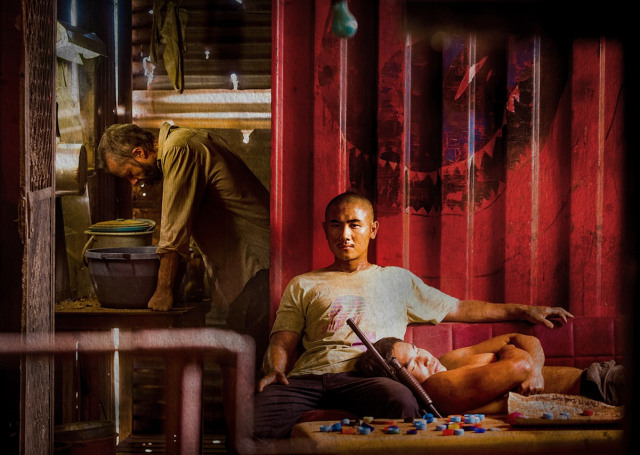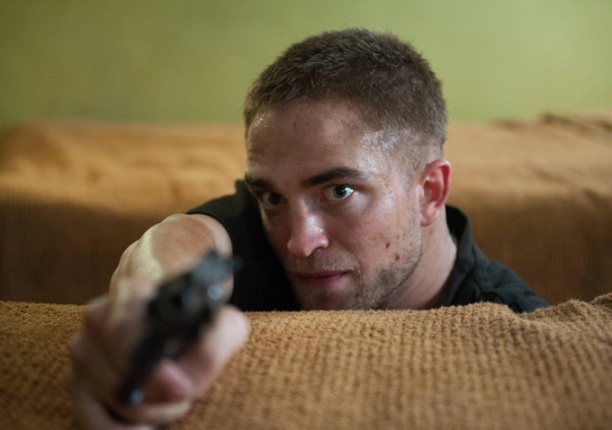Calcutta director Satyajit Ray was a colossus of cinema whose work often bridged the gap between his native Indian – specifically, Bengali – culture and that of Europe. He wrote that his 1964 film Charulata (alternatively titled in English “The Lonely Wife”) was his favourite, saying “it was the one film I would make the same way if I had to do it again”. Ray’s script is based on a novella, “The Broken Nest”, by one of the most profound cultural influences on the director, Bengali writer Rabindranath Tagore.

Mad Max script-doctored by Dostoyevsky: that’s how David Michod sees Australia after it all goes to hell. His first film, Animal Kingdom, rewired the gangster film as a suburban family horror story, sweaty with the threat and reality of violence. Michod’s debut as writer-director heads into the Outback, to make a post-apocalyptic road movie notable for steely reserve as much as swift, frequent mayhem.
 "10 years after the collapse” is our dateline. As Eric (Guy Pearce) walks into a karaoke bar in the first minute (pictured right), clues to the catastrophe are already piling up. Bottles of water are precious, and the exotic pop played oppressively loudly by the bar’s bored and armed South-east Asian staff hints at Michod’s thesis, left submerged in the film: that the West’s economy has collapsed, and Australia survives as a lawless, Gold Rush continent mined for its minerals by new Asian superpowers. Michod doesn’t need to spell this out. The point is that he has built an off-kilter world which feels real, before a word is spoken.
"10 years after the collapse” is our dateline. As Eric (Guy Pearce) walks into a karaoke bar in the first minute (pictured right), clues to the catastrophe are already piling up. Bottles of water are precious, and the exotic pop played oppressively loudly by the bar’s bored and armed South-east Asian staff hints at Michod’s thesis, left submerged in the film: that the West’s economy has collapsed, and Australia survives as a lawless, Gold Rush continent mined for its minerals by new Asian superpowers. Michod doesn’t need to spell this out. The point is that he has built an off-kilter world which feels real, before a word is spoken.
It feels most authentic in Eric's bearded face, with its damped-down anger, agony and impatience. He’s a model citizen of a place that’s running on empty and permanently dangerous. So when an American gang fleeing a robbery crash outside the bar and steal his car, Eric snaps. He wants that car back, and will go through anything and anyone for it. “What a thing to get worked up about, in this day and age,” murmurs Grandma (Gillian Jones), one of the fadedly colourful characters Eric meets on his picaresque way. The car represents a sliver of his old life. But getting it back shows how deadened he's become.
 Michod calls The Rover a Western, and the ones it most resembles were directed by Anthony Mann in the Fifties, and generally starred Jimmy Stewart at his most hysterically neurotic. As with those films, Eric has a partner on his journey who points up what’s wrong with him: slow-witted, weak-willed Rey (Robert Pattinson, pictured above), left for dead at the scene of the crime his brother’s gang were fleeing when they took Eric’s car. With his stammering Deep South accent and ravaged good looks, Pattinson’s performance is more mannered than Pearce's. Eric exists more primally, seeming to be someone so white-hot with rage that touching him would scald you, or break a bone. As an anti-hero, he’s deep in the negative zone. Nothing he does is good. Pattinson plays the wounded weakling who slows him down and makes him think.
Michod calls The Rover a Western, and the ones it most resembles were directed by Anthony Mann in the Fifties, and generally starred Jimmy Stewart at his most hysterically neurotic. As with those films, Eric has a partner on his journey who points up what’s wrong with him: slow-witted, weak-willed Rey (Robert Pattinson, pictured above), left for dead at the scene of the crime his brother’s gang were fleeing when they took Eric’s car. With his stammering Deep South accent and ravaged good looks, Pattinson’s performance is more mannered than Pearce's. Eric exists more primally, seeming to be someone so white-hot with rage that touching him would scald you, or break a bone. As an anti-hero, he’s deep in the negative zone. Nothing he does is good. Pattinson plays the wounded weakling who slows him down and makes him think.
The action scenes and the scenario of two men tearing across an empty landscape have the streamlined feel of some ambitious, forgotten Seventies exploitation pic. Michod alternates this with dragging, short scenes, dissipating momentum, not gripping with Animal Kingdom's ruthlessness. But he's reaching for something different. There’s enough violence to maintain interest, but Eric’s quest is just a way to show you Eric. “To be a killing machine is a sad thing,” someone observes. When Eric explains something awful he once did, and what the collapse of moral consequence in his broken land then did to him, The Rover is revealed as a tragedy.
Overleaf: Watch the trailer for The Rover

Director Ari Folman burst onto the scene with his brilliantly realised, quasi-autobiographical Waltz With Bashir, an animated feature that navigated between dreamscapes and reality to explore the personal trauma arising from witnessing the massacres at Lebanon’s Shabra and Shatila refugee camps as an Israeli soldier. His follow-up feature, The Congress, is highly original and fizzing with ideas.

There was a brief moment back in the day when Sylvester Stallone thought he ought to be a serious actor (remember Cop Land?), but posterity will surely recall him as the King of the Franchise. As if Rocky and Rambo weren't enough, the 68-year-old Stallone is now enjoying a major string of paydays with The Expendables, and this third instalment will merely whet the global appetite for more.

"There are 32 ways to write a story...but there is only one plot - things are not as they seem" - wisdom, courtesy of author Jim Thompson and ominously quoted in We Gotta Get Out of This Place by Sue (Mackenzie Davis) before she's swept into a nightmarish story of her own, one that takes the shape of a Thompson-esque crime thriller where things, and more specifically people, are most certainly contrary to how they appear.

It comes as no surprise that this sequel, based on the Channel 4 TV series of the same name, which saw four awkward male teenagers bond over their insecurities, offers little more than a shitstorm of juvenile humour and one-note female characters who are presented as objects to lust over. Lowbrow comedy doesn’t get any lower, and writers Damon Beesley and Iain Morris (who also take on directorial duties) predictably push the limits of acceptability which makes for occasionally funny viewing.

“Only connect!” E M Forster’s life-wish is reprised in Cambodian-born, London-based director Hong Khaou’s powerful debut feature Lilting. However, it’s not the hope for connection between lovers that his film explores, but between strangers after love, bound together in grief, in this case those who were closest to the film’s object of love. The connection is stretched by cultural differences, and only exaggerated by differences (and therefore misunderstandings) of language.

Now that the shock and dismay over Philip Seymour Hoffman’s death has subsided, we have the chance to see his final performances and recall an actor like few others. I can’t think of many who managed to emit so much power and convey so much human complexity without an iota of visible “acting”.
Depardieu as an imaginary version of Dominique Strauss-Kahn was always likely to be a study in grossness. Add director and co-writer Abel Ferrara, the hardcore extremist behind Driller Killer and Bad Lieutenant, and a white-knuckle night out is guaranteed. Depardieu’s powerful French banker Devereaux is a creature of grotesque and relentless appetites, alright, a bloated sex addict and rapist. But actor and director also insist he is human and shamelessly so, even as he sacrifices others to his desires.

Against the background of the spectacular scenery of Patagonia, Argentinian director Lucia Puenzo creates a tight, subtly unnerving thriller in her third film Wakolda. Its American release title “The German Doctor” reveals its subject more immediately, which is the time spent by Nazi physician Josef Mengele (Alex Brendemuhl) in Latin America after his flight from Europe.

